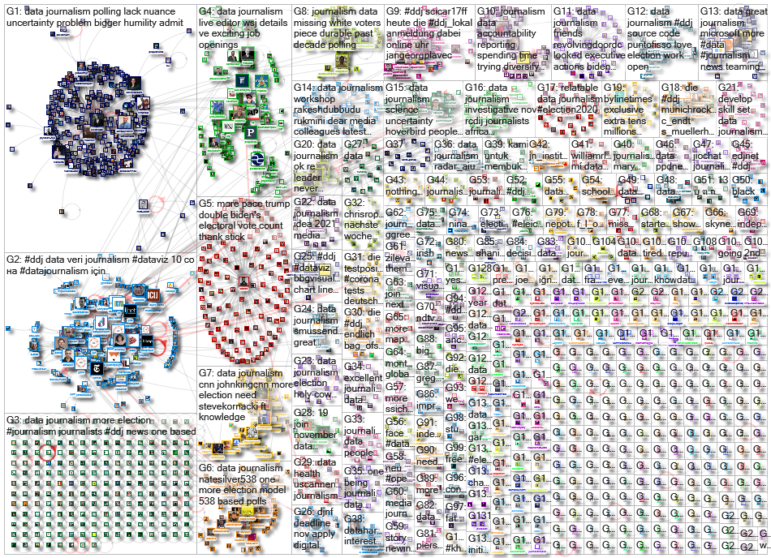The recent US presidential election dominated Twitter chat waves last week. Our NodeXL #ddj mapping from November 2 to 8 found data journalists sharing live election results trackers by Bloomberg, The Washington Post, and The New York Times. The Atlantic and Slate weighed in on the problems of polling, Germany’s ZDF heute looked at musical taste by political party, while open source platform Mapbox organizes an election mapping contest. In other news, Lazer Lab created a dashboard to explore 29 million tweets related to COVID-19, while Microsoft Research released an open source visualization platform.
Musical Tastes Across the US
Does musical taste vary by political persuasion? Using data from digital streaming service Spotify and Google Trends, German television program ZDF heute analyzed the musical tastes of Americans and found that people in Republican states apparently prefer pop and country, while those in Democratic states often listen to hip hop and rap.
Republikaner lieben Country, Demokraten hören nur Rap? Was Spotify-Daten über den Musikgeschmack der USA verraten #ddj: https://t.co/wSThULIYmm pic.twitter.com/UQNdnvVOTA
— ZDF heute (@ZDFheute) November 2, 2020
Election Results Trackers
Many news organizations were live-tracking the results of the US presidential election last week. Bloomberg’s graphics drew particular praise from the data journalism community. The Washington Post’s live results page and The New York Times’ interactive were also popular.
I’ve looked at a lot of maps on a lot of websites tonight and I think stylistically, Bloomberg’s is the nicest. Illustrated portraits! https://t.co/ybBTsr6Kn4
— Louie Mantia, Jr. (@Mantia) November 4, 2020
The Polling Problem
There isn’t much sympathy for pollsters on Twitter in the wake of the US presidential election, particularly for FiveThirtyEight — a site well known for its opinion poll analysis. The site was among those predicting a bigger win for Democratic candidate Joe Biden, but Republican incumbent Donald Trump came much closer than expected. The results raise questions about the value of polling, and about what went wrong. David A. Graham and Joshua Keating both weighed in on the problem in The Atlantic and Slate, respectively.
Smart analysis by @GrahamDavidA on why the pollsters’ failure matters https://t.co/dRDiir9Qkv
— Bill Adair (@BillAdairDuke) November 5, 2020
Podcast: The Seen and The Unseen
In episode 196 of The Seen and the Unseen podcast — which looks at politics, economics and behavioral science — Amit Varma interviews data journalist Rukmini S. The segment covers her background in journalism, the learning curve for working with data, and her podcast on COVID-19, The Moving Curve, in which two nights a week she considers a question around the coronavirus epidemic in India.
It's great to hear @Rukmini story. Besides being great data journalist, she speaks with no pretence and has a soothing and reassuring voice #MovingCurve@amitvarma https://t.co/duHAg5dOYv
— Narendra Ganpule (@NarendraGanpule) November 4, 2020
US Election Mapping Contest
Back to the US: In the aftermath of the vote, Mapbox is running an election mapping contest. Build a map, write a blog post to describe how you built it, and enter the contest before the November 30 deadline. Categories include: best untold story, best practical tool, and best data mashup. Find out about the criteria and prizes here.
Did you hear? The deadline for the #electionmapping contest is extended to Nov 30th so you can dig into the data and stories of the historic 2020 US election: https://t.co/vVH9FeyYkD #mapping #webdevelopment #journalism pic.twitter.com/XbgcK7bNiL
— Mapbox (@Mapbox) November 8, 2020
Charticulator: A Visualization Platform
Microsoft Research has released an open source visualization platform — Charticulator. The platform not only enables charts to be created from data using a simple drag-and-drop interface, it enables full customization of the elements within charts in the same way.
Charticulator from @MSFTResearch looks a useful tool to add to the growing choice of template-based online Data Viz tools. Worth also considering @DataWrapper & @F_l_o_u_r_i_s_h, a useful new generation for non-coders: https://t.co/kIApoadjME #DataViz #software #PeopleSideOfData
— Paul Laughlin (@LaughlinPaul) November 3, 2020
Analyzing COVID-19 Tweets
What are a half million Americans tweeting about regarding COVID-19? Researchers from Northeastern University’s Lazer Lab in Boston created a dashboard that allows you to explore the top links, domains, and keywords extracted from 29 million tweets related to COVID-19 shared between January 1 and October 30.
Excited to launch this interactive app with @davidlazer and team exploring top links, domains and keywords across 29 million Covid-19 related tweets. https://t.co/vbyr9HKiYM
Read the report on who is sharing misinformation in that dataset here: https://t.co/uSocnovZMt pic.twitter.com/Ow0blx1cNF
— Aleszu Bajak (@aleszubajak) October 21, 2020
Swing States Explained (in Spanish)
Journalists Ferran Morales, Maria Crosas, and Miquel Pellicer put together an explainer on swing states related to the US presidential election and analyzed potential outcomes based on historical election data from the 2008, 2012, and 2016 elections.
Ready for today's #Election2020 polls ? Understand the role of the #SwingStates and what early voters are saying 👉 https://t.co/fe6o6ATP3J #dataviz #ddj pic.twitter.com/lD9BTmgB89
— Maria Crosas (@mcrosasb) November 3, 2020
Data Journalism Funding (Malaysia and Latin America)
Malaysian journalists can apply for a data journalism workshop organized by the European Union, Internews, Data-N, and the Sinar Project, which takes place over four days later this month. Selected participants stand a chance to win story grants worth €2,000 each upon completion of the workshop. Apply here. For journalists in Latin America who attended at least one of the Knight Center’s recent Spanish-language data journalism training sessions, there is an opportunity to win US$10,000 data journalism funding for your newsroom. Details here.
Supercharge Your Storytelling with Data Journalism
Apply to participate in a free workshop on #datajournalism led by award-winning digital journalist Kuek Ser Kuang Keng #Malaysia @Internews
Register for this free workshop by Friday, 13 November 2020https://t.co/wOaDhtJx0Z
— 𝗔𝘀𝗮𝗱 – اسد 🚴♂️ (@AsadJan80) November 3, 2020
Data Journalism Tutorials (in Russian)
Russian investigative news site IStories is uploading data journalism tutorials on its YouTube channel. The latest lessons deal with the programming language Python, for which you can view part 1 and part 2. For more, check out this tweet thread.
#16. Начинаем погружаться в дивный мир программирования на Pythonhttps://t.co/hZiUjLcQCJ
В первом уроке разбираемся с Jupyter Notebook и типами данных
— Важные истории (@istories_media) November 4, 2020
Thanks again to Marc Smith and Harald Meier of Connected Action for gathering the links and graphing them. The Top Ten #ddj list is curated weekly.
 Eunice Au is GIJN’s program manager. Previously, she was a Malaysia correspondent for Singapore’s The Straits Times, and a journalist at the New Straits Times. She has also written for The Sun, Malaysian Today, and Madam Chair.
Eunice Au is GIJN’s program manager. Previously, she was a Malaysia correspondent for Singapore’s The Straits Times, and a journalist at the New Straits Times. She has also written for The Sun, Malaysian Today, and Madam Chair.

